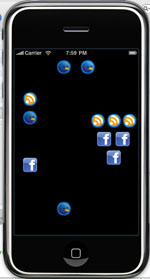
Students who drag their feet over an essay or math problems will stay up all night to level up a “World of Warcraft” character or figure out shortcuts to game sites.
A class at Washington University in St. Louis taps directly into the astonishing motivational power of the mashup of computers, gaming and popular culture.
In the class, the students develop applications, popularly known as “apps,” for the iPhone and iPad, the digital tablet that was released to consumers April 3.
The class is taught by Todd Sproull, PhD, a lecturer in the Department of Computer Science and Engineering in the School of Engineering & Applied Science.
“My job is to give students the fundamentals for iPhone application design,” Sproull says. “But the really fun part is seeing how creative and innovative they can be with those tools.”
Junior Andrew Shaw was chosen as teaching assistant because he already had written several apps for the iPhone on his own — one of which was just a little too successful.
Shaw and his brother are fans of the anime Naruto, a popular Japanese animation and comic series. The brothers frequently checked a Web site that posts scans of the comics at unpredictable intervals to see if a new issue was up.
Checking got annoying, so Shaw designed an iPhone app that was a Naruto alerter. Users received a text message when a new issue was posted and could download and read it on their iPhone.
But Shaw made a small mistake. He charged money for the app, and it sold well enough that he was making real money. The app attracted the attention of VIZ Media, the company that licenses the comic for U.S. distribution, which sent Shaw a cease-and-desist order requiring him to remove the app from the store.
Nothing that exciting happened during the class, but the students — most of whom don’t even own an iPhone, came up with some interesting apps:

Nightstand: Shaw played it safe and created a nightstand app that turns the iPhone into an alarm clock. It comes with a shaker mode that prevents the alarm from shutting down unless the user actually finds the phone, picks it up and shakes it. (He admits to being a slugabed.)
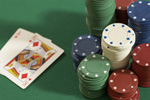
Blackjack counter: This app teaches the user how to count cards in blackjack, a game where high cards are good for the player and low cards are good for the dealer. Last year, the Nevada Gaming Control Board issued a warning that an iPhone card counting application was illegal in that state, but there’s no law against learning to count and doing it in your head.

Crisper: A third to half of the groceries Americans buy are thrown in the garbage because they go bad before they can be eaten. This app helps keep track of what’s in the crisper, warning the user when the celery is going limp or the fish is going bad.
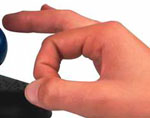
eFlick: This is a WUSTL version of the ESP game, an online game that helps improve image searches by enlisting volunteers to come up with labels for images. In the WUSTL version, the players flick videos of Washington University events into categories, such as sports or academics.

Ergonomic logbook: This app is intended for the WUSTL crew team. According to a tweet from one of its creators — members of the WUSTL varsity crew team — it’s an erg logbook that lets team members enter and keep track of their workouts online. It’s also a pace calculator that lets users check to see whether they’re pacing evenly during a workout.
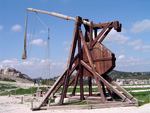
Ballistics Calculator: This app is educational in the pre-iPhone sense. Given a value for gravity and the initial velocity and angle of release of a yellow ball, the app shows users how to derive an equation of motion and then traces the ball’s trajectory.
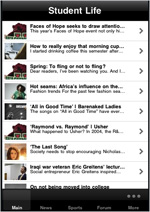
Mini Student Life
Mini Student Life: This app customizes the Web site of WUSTL’s student newspaper, Student Life, to fit on the iPhone so that it can be read without scanning and resizing.
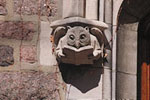
Can you Flickr me here?
Can you Flickr me here? This app finds pictures from Flickr, a popular image-hosting Web site and community, that were taken near the user’s current location. So, for example, a user standing under the arch of Brookings Hall on the WUSTL campus might be shown a photo of the studious owl on the north side of the archway.

Personal trainer
Personal trainer: This app lets personal trainers design workouts for clients and keep track of their progress, thus replacing the sheets of paper in folders in the milk crate in a corner of the weight room at the local gym.